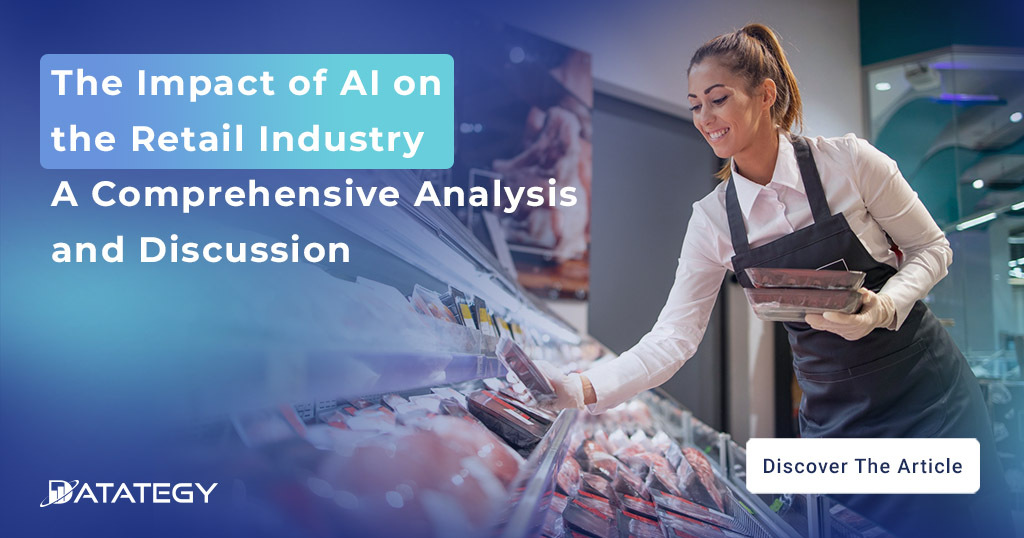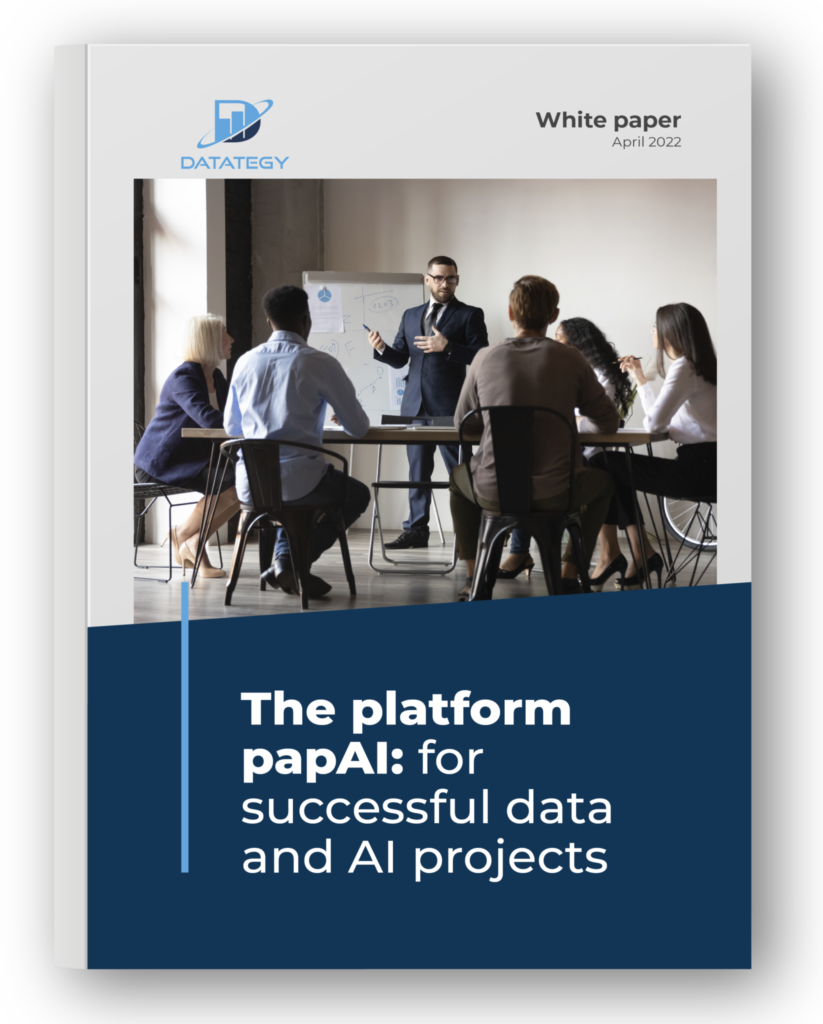How Law Firms Use RAG to Boost Legal Research RAG...
Read MoreThe Impact of AI on the Retail Industry: A Comprehensive Analysis and Discussion
Table of Contents
ToggleThe retail industry is undergoing a profound transition as a result of the industry’s ongoing evolution and the fast growth of technology. Artificial intelligence is a major force behind this transformation (AI). In 2023, AI is anticipated to be a key factor in assisting the retail industry in driving development, enhancing operations, and improving consumer experiences. AI services in the retail sector are predicted to increase from $5 billion to above $31 billion by 2028.
The potential uses of AI in retail are numerous and diverse, ranging from enhancing customer experiences to streamlining inventory management. This article intends to present a thorough examination of the effects of AI on the retail sector in 2023. It will offer insights into how retailers may use this technology to stay competitive by examining the various ways that AI is transforming the retail sector.

COVID-19: Accelerated AI for retail
The COVID-19 epidemic has had a significant influence on the retail sector and has significantly sped up the adoption of artificial intelligence (AI) in the sector. With customers increasingly turning to e-commerce in the face of lockdowns and social isolation measures, the move toward online purchasing that started before the outbreak has been further accelerated. As a result, merchants are now under pressure to swiftly modify their business practices to satisfy customers’ shifting needs, and AI has become a crucial instrument in this process.
According to a recent survey by Salesforce, 71% of retail executives believe that the pandemic has accelerated their company’s digital transformation by an average of three years. This has led to a surge in investment in AI technologies, as retailers look to improve their e-commerce operations, personalize shopping experiences, and better manage their inventory.
Another survey by McKinsey & Company found that 72% of retailers have increased their investment in AI since the start of the pandemic, with a focus on areas such as chatbots and virtual assistants, predictive analytics, and automated supply chain management. These investments have already begun to pay off, with retail companies reporting improved customer satisfaction, increased sales, and reduced operational costs as a result of their AI implementation.
The benefit to used AI in the retail industry
In recent years, the application of artificial intelligence (AI) in the retail sector has expanded quickly and has shown to be a game-changer for organizations. Retailers can now more easily manage their operations, boost productivity, and provide customers with a better shopping experience thanks to AI technology, which offers several advantages. Here are a few ways artificial intelligence has transformed the retail sector.
1- Personalization
One of the most important uses of AI in the retail sector is personalization. AI-powered systems may offer tailored suggestions and experiences by evaluating consumer data, increasing user engagement and loyalty. Here are a few ways artificial intelligence is being applied to personalization in the retail sector:
Product Recommendations: AI-powered systems can analyze a customer’s purchase history, browsing behavior, and other data to provide personalized product recommendations. This helps retailers to drive sales and increase customer satisfaction, as customers are more likely to purchase products that are relevant to their interests and needs.
Personalized Marketing: AI-powered systems can analyze customer data to provide targeted marketing campaigns, such as personalized email campaigns, SMS, and push notifications. These campaigns can be designed to promote specific products, offer discounts, and provide relevant information to customers, thereby improving engagement and conversion rates.
Personalized Shopping Experiences: AI-powered systems can provide personalized shopping experiences, such as personalized product searches, customer support, and checkout processes. This enhances the overall customer experience, as customers feel that retailers understand their needs and preferences.
Personalized Pricing: AI-powered systems can analyze customer data to provide personalized pricing, such as dynamic pricing and personal discounts. This helps retailers to increase sales and improve customer satisfaction, as customers feel that they are getting a fair deal.
How to choose the best AI solution for your data project?
In this white paper, we provide an overview of AI solutions on the market. We give you concrete guidelines to choose the solution that reinforces the collaboration between your teams.

2- Inventory Management
Another crucial area where AI is helping the retail sector greatly is inventory management. AI-powered solutions may assist merchants in minimising waste, cutting expenses, and raising customer happiness by optimising inventory levels. Here are some examples of how AI is being applied to retail inventory management:
Demand Forecasting: AI-powered systems can accurately predict consumer demand by analyzing sales data, consumer behavior, and market trends. This helps retailers to optimize inventory levels and avoid overstocking or stock shortages, leading to improved efficiency and reduced waste.
Real-time Inventory Management: AI-powered systems can provide real-time updates on inventory levels, allowing retailers to quickly respond to changes in consumer demand. This helps retailers to maintain accurate inventory records and avoid stock shortages, leading to improved customer satisfaction.
Predictive Replenishment: AI-powered systems can predict when inventory levels will fall below a certain threshold and automatically generate replenishment orders. This helps retailers to avoid stock shortages and maintain optimal inventory levels, leading to improved efficiency and reduced waste.
Inventory Optimization: AI-powered systems can analyze inventory data to identify slow-moving or underperforming products, helping retailers to optimize their inventory levels and minimize waste. This leads to improved efficiency, reduced costs, and increased profitability.
3- Customer service
Any retail organization must prioritize delivering excellent customer service, and AI is helping retailers in this regard in many ways. AI-powered technologies can assist merchants in enhancing customer satisfaction and lowering response times by automating repetitive processes and offering round-the-clock service. The retail sector is using AI in the following ways for customer service:
Chatbots: AI-powered chatbots can provide 24/7 customer service, answering customer queries, and resolving issues in real-time. This allows retailers to provide better customer support, reduce response times, and improve customer satisfaction.
Virtual Assistants: AI-powered virtual assistants can assist customers in finding products, checking inventory levels, and completing purchases. This helps retailers to improve customer experience and increase sales, as customers are more likely to complete purchases when they have access to relevant information and support.
Customer Insights: AI-powered systems can analyze customer data to provide valuable insights into customer behavior, preferences, and pain points. This information can be used to improve customer service and support, as retailers can better understand and respond to customer needs and concerns.
Automated Customer Service: AI-powered systems can automate routine customer service tasks, such as handling returns and processing orders. This allows retailers to free up valuable time and resources, enabling them to focus on other important tasks, such as improving customer experience and developing new products and services.
4- Predictive analytics
Many retailers are using the potent instrument of predictive analytics to enhance operations and gain a competitive edge. Retailers may make better decisions and increase productivity by using AI-powered predictive analytics systems, which analyse data and generate predictions about future occurrences. Here are a few examples of how AI is applied to predictive analytics in the retail sector:
Sales Forecasting: AI-powered systems can analyze sales data and market trends to make accurate predictions about future sales. This helps retailers to optimize their operations, improve efficiency, and make informed decisions about product development and marketing.
Customer Segmentation: AI-powered systems can analyze customer data to segment customers into different groups based on their behavior, preferences, and purchasing patterns. This information can be used to develop targeted marketing campaigns and improve customer engagement and loyalty.
Price Optimization: AI-powered systems can analyze sales data, market trends, and competitor pricing to make accurate predictions about optimal pricing. This helps retailers to price their products competitively, improve margins, and increase sales. By taking into account various factors such as demand, seasonality, and customer demographics, AI-powered price optimization systems can provide retailers with valuable insights and help them to make data-driven pricing decisions that drive growth and profitability.
5- Fraud detection
For merchants, fraud detection is a critical issue since fraud may lead to large financial losses, reputational harm, and a decline in customer confidence. Many merchants are using AI-powered technologies to identify and stop fraud in real-time, preventing damages to their company and customers. Here are several applications of AI in the retail sector for detecting fraud.
Real-time Monitoring: AI-powered systems can monitor transactions and detect potential fraud in real-time, allowing retailers to take immediate action to prevent losses.
Behavioral Analytics: AI-powered systems can analyze customer behavior, such as purchase patterns, IP addresses, and device types, to detect anomalies and flag potential fraud. This helps retailers to prevent fraud and protect their business.
Predictive Modeling: AI-powered systems can use predictive modeling techniques to identify potential fraud based on historical data and patterns. This helps retailers to proactively detect and prevent fraud before it occurs.
6- Automation
AI is having a significant influence on the retail sector, particularly in the area of automation. AI-powered technologies enable staff to concentrate on more complex activities while increasing productivity by automating repetitive and routine jobs. Here are some examples of how AI is being applied to automate the retail sector.
Order Processing: AI-powered systems can automate order processing, from receiving and verifying orders to generating invoices and shipping labels. This helps retailers to improve efficiency, reduce errors, and increase accuracy.
Inventory Management: AI-powered systems can automate the tracking and management of inventory levels, including reordering, restocking, and forecasting. This helps retailers to optimize inventory levels, reduce waste, and improve customer satisfaction.
Customer Service: AI-powered chatbots can automate customer service tasks, such as answering frequently asked questions, processing returns, and providing product information. This helps retailers to improve efficiency, reduce wait times, and enhance the customer experience.
Supply Chain Management: AI-powered systems can automate the tracking and management of the supply chain, including supplier management, logistics, and distribution. This helps retailers to optimize operations, reduce costs, and improve efficiency.
Conclusion
In conclusion, the benefits of AI in the retail industry are numerous and far-reaching. From personalization and inventory management to customer service, predictive analytics, fraud detection, and automation, AI is transforming the retail industry in numerous ways, helping retailers to improve efficiency, reduce costs, enhance the customer experience, and drive growth and profitability.
By leveraging the power of AI, retailers can gain a competitive edge and stay ahead of the curve. To learn more about how AI can help your retail business, we invite you to book a demo of our papAI platform today. Our team of experts will provide you with a personalized demo and answer any questions you may have. Take advantage of this opportunity to learn more about the benefits of AI and how it can help you to achieve your business goals.
Interested in discovering papAI ?
Our commercial team is at your disposal for any question.
How RAG Systems Improve Public Sector Management
How RAG Systems Improve Public Sector Management The most important...
Read MoreScaling RAG Systems in Financial Organizations
Scaling RAG Systems in Financial Organizations Artificial intelligence has emerged...
Read More

